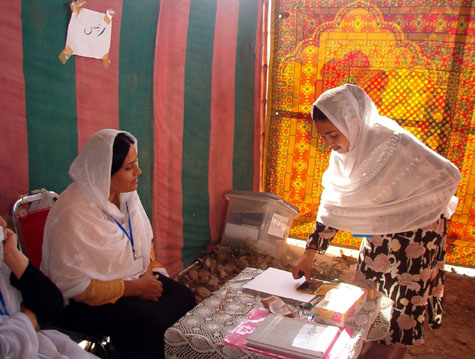Gender and Governance
The participation of women in politics is a human right and a development goal. When women participate in politics, there  are benefits for women, men, children, communities and nations.
are benefits for women, men, children, communities and nations.
Governance
Governance does not refer only to political participation but is defined (by the United NationsDP) as “the exercise of political, economic and administrative authority in managing a country’s affairs“. It comprises the mechanisms, processes and institutions through which citizens and groups articulate their interests; exercise their legal rights, meet their obligations and mediate their differences.” This definition stresses the need to look at formal as well as informal participation and involvement in political and economic processes, that is looking at the role of the state as well as those of civil society, Non Governmental Organization and other institutions.
Governance does not belong only to the public realm, however, it has consequences for the private sphere since policies that protect individuals’ health and legal rights, or promotes family policy favourable to women’s empowerment; for example, ensure that these individuals can take an active role in the public sphere. Governance therefore crosses both public and private spheres.
Gender Inequality and Governance
Gender Equality depends on democratic, and gender-sensitive governance since typically women, who are or feel marginalised from the public sphere and administration do not feel empowered to take action or participate in governance. More importantly, they do not take steps to make changes to ensure that governance is gender-sensitive. As a result, laws, policies and government institutions do not reflect the needs of all citizens, nor may they be conducive to encouraging progress, and protecting women’s rights.Some women may feel that they cannot participate in the public sphere due to concerns over male/female socially acceptable roles. In studies of South Asia , for example, cases of women who sought to enter public life faced intimidation or even Domestic violence by male members of their family or kin group due to traditional notions of female domestic duties which were in conflict with any participation in public life.Yasmin Tambiah, “The Impact of Gender Inequality on Governance” in Essays on Gender and Governance, p. 63
UN agencies like United NationsDP and United NationsIFEM and other Non Governmental Organization invest in programmes that strategically build the capacity of women and democratic systems to encourage women’s political empowerment. Improving literacy, training future women leaders and helping women into all levels of government are key tools. In addition, ensuring that legislation is gender-sensitive is also a priority. Gender Justice requires every dimension of justice to incorporate gender perspectives. It rests upon the full participation of women in shaping legal institutions that promote their rights, equality and inclusion. UNIFEM supports women’s efforts to change discriminatory laws, address violations of human rights and war crimes, and eliminate the injustices stemming from political, economic and social inequalities.
UNDP’s Work on Women’s Political Empowerment
UNDP’s projects focus on the following objectives to achieve women’s political empowerment:
- Increase the number of women in public office
- Enhance women’s leadership by helping to reform electoral processes, change political parties, and strengthen parliaments, judiciaries and the civil service
- Strengthen women’s organisations ability to advocate and implement projects that promote women’s rights
- Promote judicial reform to ensure equal legal protection to poor women and men
- Ensure that essential public services like health and education benefit poor women, men, girls and boys equitably
- Promote the ratification, implementation, and reporting on women’s international and regional women’s instruments such as the CEDAW
- Reduce gender-based violence
See Also
- Women's Political Empowerment
- Gender Responsive Governance
- Nino Burjanadze- Political Empowerment
Sources
- http://www.undp.org/governance/gender.htm
- http://www.iknowpolitics.org/fr/node/72
- Yasmin Tambiah, “The Impact of Gender Inequality on Governance” in Essays on Gender and Governance, ed. M. Nussbaum et al (UNDP, 2003).
- http://www.unifem.org/gender_issues/governance_peace_security/at_a_glance.php


